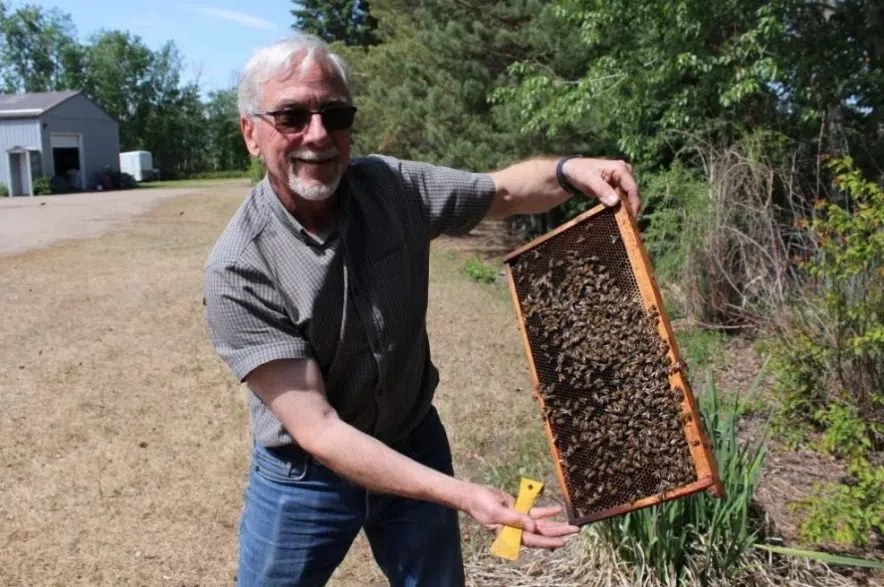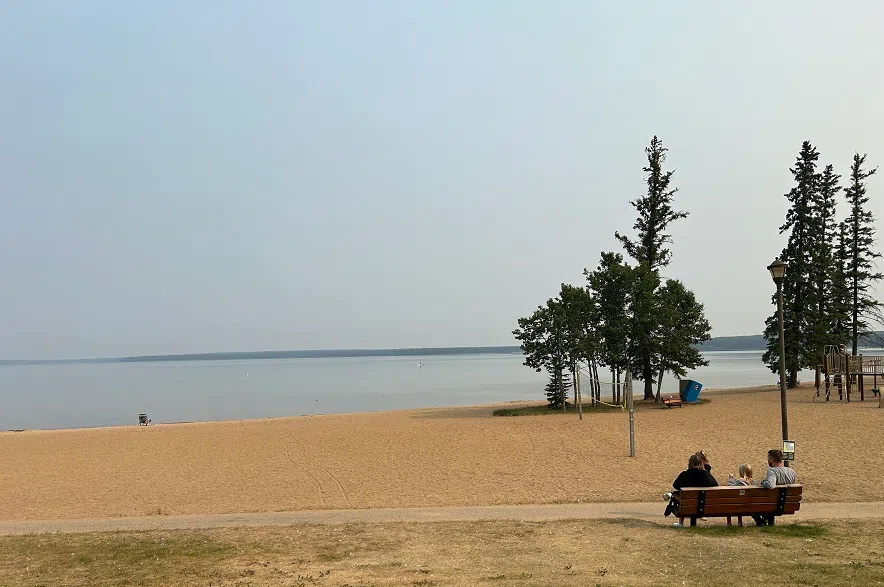It was another normal day for vacationers and business owners in Waskesiu on Wednesday, despite warnings from Parks Canada urging people in the town to be on an evacuation alert, just in case the Buhl Fire gets closer to the community.
On Wednesday, the sun rose and the sky was mostly clear despite the fires burning only 30 km away. It was smokier in Saskatoon and Prince Albert than in Waskesiu.
Although it was a beautiful day in the community, the town was quieter than normal. Some businesses in the area admitted that the number of people in the town has felt more like the middle of June as opposed to the middle of July.
“We’re not really concerned right now,” said Chuck Mason, a food and beverage manager at the local golf course. “It’s still quite a ways away. Business is down, a lot of people have gone home, but we can’t fight Mother Nature.”
Read more:
- Buhl Fire still not close enough to Waskesiu to issue evacuation alert, Parks Canada says
- Wildfires merging into larger blazes, says SPSA president
- Wildfire smoke chokes southern and west central Sask. on Tuesday
Mason mentioned that normally for this time of year, the parking lot for the golf course is full, but on Wednesday, it was only about half that.
But he added this isn’t the only week the golf course has struggled, and mentioned the smoke from fires most of the year has deterred players from playing.
“We’re concerned about smoke because of its health problems for people. People don’t want to walk around in the smoke all day,” Mason added.
Not far down the road at the marina, Rayne Cook said business has been slow at the docks, too.
“For those of us working in the park here, it does feel like business as usual, but we are definitely seeing a downturn in foot traffic,” Cook said. “I think there was a lot of initial panic just with some of the messaging out there, but we’re not concerned.”
Parks Canada has reiterated that there’s no immediate threat to the community regarding the Buhl fire.
Cook said there aren’t too many people who’ve decided to pull their boats out of the dock because of the wildfire threat.
“We’ve seen a few folks, particularly those who are from further away or out of province, just be prepared. They’d hate to leave town and then have something happen. That makes complete sense,” Cook said. “For the most part, folks are still here and still going on the lake and enjoying their days.”
Keith Compton drives up every year for holidays from Assinaboia and had zero concerns about the wildfires approaching.
“Today’s beautiful,” he said.
“You can see the smoke over on the horizon there, but this is beautiful right now.”
He suggested that if he had to evacuate, he’d be able to get out pretty quickly.
“You got a lot of time to get out of dodge if you have to,” Compton said. “We’ve got a motor home, gazebo and all that stuff, boat in the water, we could be out in two hours.”
Talking to people in the community about the last five years of wildfires, Cook said some people tell her there have been worse times.
“We’ve had many closer calls on this,” she explained. “I think that’s definitely keeping those who have been in the park longer a little bit more level.”
Sask. beekeeper feeling the sting of wildfire smoke
Beekeepers often use some smoke while tending to the hives, but wildfire smoke is posing a problem for some Saskatchewan honey businesses.
“It feels like we’re losing some ground as far as the production of honey these days while canola is in bloom,” said Murray Hannigan, who owns and operates Hannigan Honey in Shellbrook.
Hannigan said the bees are less stimulated to go out and gather when skies are smoky. In addition, the smoke reduces the amount of radiation getting to flowers, lowering nectar production.
“The bees are getting out to the flowers and coming back with smaller loads of honey as a result,” he said.

Murray Hannigan owns and operates Hannigan Honey in Shellbrook, a business that was started by his father, Albert, in the 1940s. (Brittany Caffet/650 CKOM)
Hannigan said his business is in the worst drought it’s seen in over 20 years, and wildfire smoke is adding another layer of stress.
“I would say the combination is sort of like the perfect storm,” he said. “It’s very dry, and now we’re getting the smoke, which is impacting the ability for both the flowers and the bees.”
At this point in the season, Hannigan said he feels like his operation could lose several $100,000 dollars in production.











